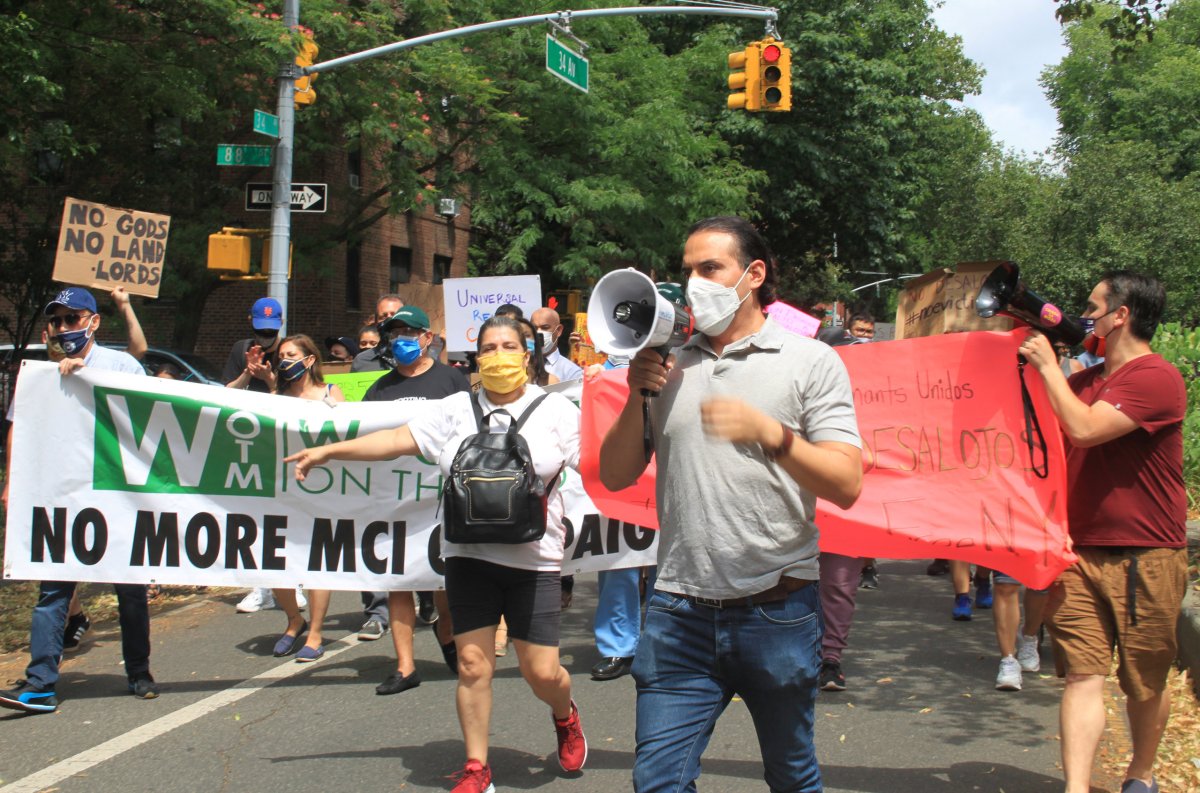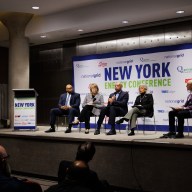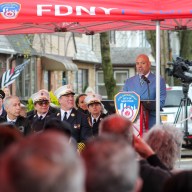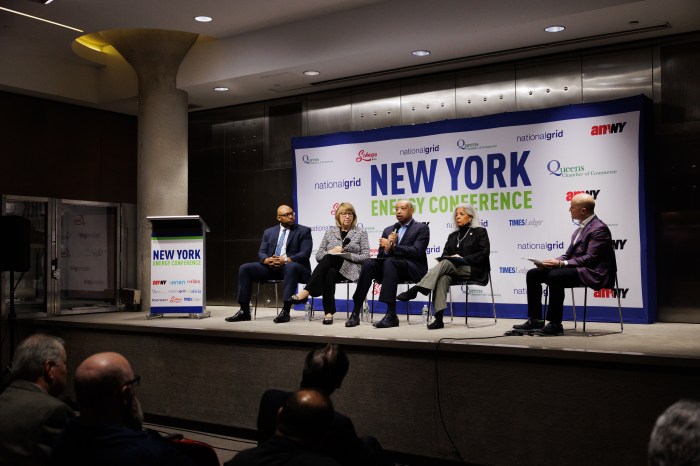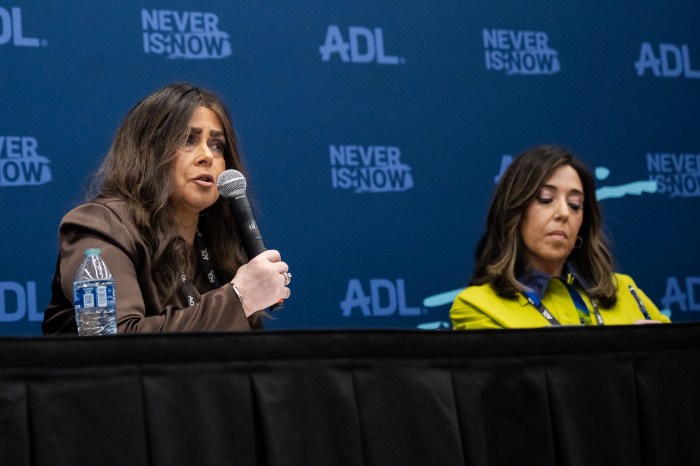The movement to cancel rent has shifted to demands for a stop to all residential evictions and a pause on housing courts proceedings as New York’s eviction moratorium nears its deadline.
Woodside on the Move, a grassroots advocacy organization based in western Queens, and the 89th Street Tenants Union led a protest in Jackson Heights on Tuesday, July 7, to demand Gov. Andrew Cuomo pass legislation that would prevent renters impacted by COVID-19 from getting displaced.
“We’re not going to allow a person to be thrown on the street because they can’t afford to pay rent,” said Iván Contreras, an organizer with Woodside on the Move. “Even if we have to chain ourselves to the apartment of someone who’s at risk, we won’t let them kick them out of their home. Kicking you out of your home now would be the same as sending you to a hospital in the time that we’re living.”
More than 50 residents of Jackson Heights and Woodside joined the march, which began at 89th Street and 34th Avenue and ended at Travers Park, where community leaders spoke about the “wave of evictions” predicted to take place once the state’s eviction moratorium fully ends on Aug. 20.
The eviction moratorium ended on June 20, but was extended to August for those who are eligible for unemployment and can prove financial hardship according to Cuomo’s executive order.
Housing rights advocates predict up to 50,000 new eviction cases might be filed in New York’s housing courts once they reopen. With courts opening last week, the Right to Counsel NYC Coalition set a list of demands for housing courts that includes an extension to the universal eviction moratorium and a slow down of case proceedings.
The protest in Jackson Heights was one of several that took place on Tuesday throughout the city.
At Travers Park, Maria Segura, a member of Woodside on the Move, spoke in Spanish about Cuomo’s refusal to cancel rent.
“I feel desperate. I feel sad because we see how Governor Cuomo is acting in an inhumane way, almost irrational. I feel desperate because I see a wave of evictions for the whole community, a working community that has helped this city move forward,” Segura said. “We’re here to tell the courts to not dare receive cases to evict the community.”
Segura lives in Cosmopolitan Houses, where tenants staged a strike months ago to pressure officials to cancel rent so those who can’t afford to pay their bills as a result of job loss wouldn’t be faced with eviction notices from their landlords.
Andrew Sokolof Diaz, co-founder of the 89th Street Tenants Union, said an unclear path forward has made it harder for folks living in uncertainty.
“We’re tired of this,” Sokolof Diaz said. “Week after week, we hear of delays and deadlines extended and moratoriums and we’re being thrown scraps, like we’re supposed to be grateful for this. That’s not right. It’s criminal.”
Sokolof Diaz said they have tenants who have been on rent strike since April.
State Senator Jessica Ramos joined the march as a “tenant and neighbor,” she said. She addressed protesters first in Spanish then in English, saying her and other colleagues in the Senate sent Cuomo a letter asking him to reconsider opening the courts.
“Even though we passed some reform last year, we weren’t prepared for this,” Ramos said. “We’re expecting 20 million to be essentially eligible for eviction by September 30 in the United States of America, the richest country in the world, in the state where the income inequality is the greatest.”
Senator @jessicaramos said she joined the march as a tenant and neighbor.
She then said her and several colleagues sent a letter to Gov. Cuomo asking him to “reconsider and please keep housing courts closed because the statistics are completely alarming.” pic.twitter.com/QmwAF5E15s
— Angélica M. Acevedo (@angacevedo15) July 7, 2020
Ramos then mentioned her excluded workers bill that would tax New York’s billionaires — which she said there are more of now than there were before the pandemic — in order to create a fund for folks who didn’t qualify for federal or state COVID-19 stimulus.
“This is money that can go to pay for rent, to buying food, to getting medicine that perhaps your family needs, to buying your own PPE because your employer doesn’t provide it for you,” she said.
A study by the Center for an Urban Future found that half of New York City’s immigrants, many of whom are essential workers, are suffering the deepest economic losses from the pandemic but have benefited the least from government relief efforts.
Assembly candidate Jessica González-Rojas also attended the protest, and noted that 66 percent of District 34 (which encompasses Jackson Heights, East Elmhurst, and parts of Woodside and Corona) are “worried about putting food on the table for their families, jobs and earning money.”
“And yet they have to think about whether they’re going to have a roof over their heads at night,” González-Rojas said. “That is unacceptable in this moment, in this country.”
There are several bills introduced on all levels of government to address rent and mortgage fears as a result of the pandemic, but they are still waiting to be signed into law.
Cuomo recently signed the Emergency Rent Relief Act of 2020, introduced by Manhattan Senator Brian Kavanagh, which would provide rental assistance vouchers to landlords on behalf of tenants who experienced an increase in rent burden because of a loss of income as a result of the pandemic. But supporters of Queens Senator Michael Gianaris’ bill to cancel rent altogether for residential and commercial tenants say the bill is a modest version of what tenants need.
Advocates say it’s ultimately up to Cuomo to stop evictions from taking place en masse come August.
“I laugh when they say we want hand outs,” Contreras said. “We have two, three and sometimes four jobs to be able to live in this nation. Nobody wants handouts; we want fair distribution of wealth. It’s not fair that we work, but in the time of a pandemic they turn their backs on us.”

